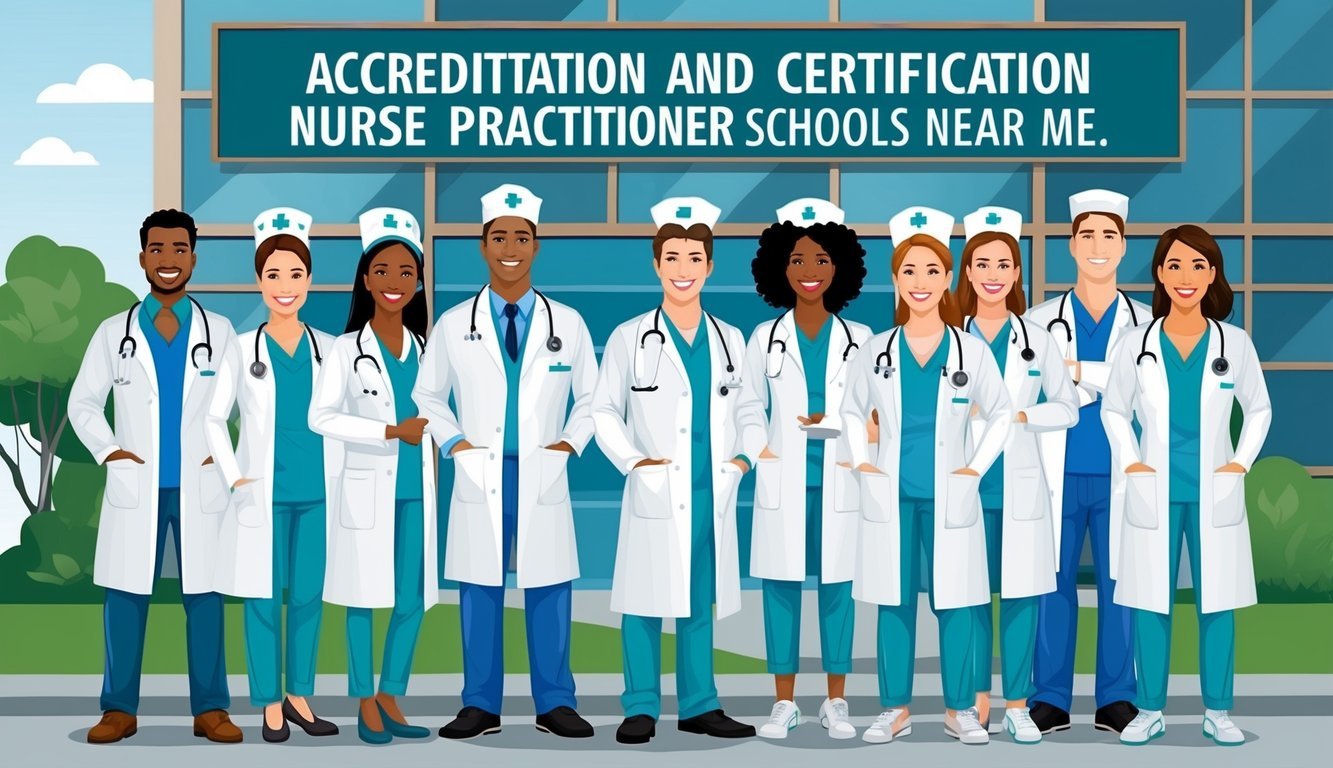When you consider advancing your nursing career, exploring nurse practitioner schools near you can be the first step toward a fulfilling and lucrative path.
Nurse practitioners (NPs) play a vital role in healthcare, providing essential services, diagnosing patients, and even prescribing medications.
Their expertise is in high demand, making the decision to further your education a smart one.
Finding the right NP program can greatly impact your professional growth. There are numerous accredited nurse practitioner programs across the country.
They cater to various specialties and learning formats, including online and hybrid options. This flexibility allows you to choose a program that fits your lifestyle and educational needs.
To identify the best options nearby, consider factors such as program accreditation, available specializations, and the support offered for clinical placements.
Resources like the American Association of Nurse Practitioners (AANP) can provide guidance in selecting the ideal program for you.
By doing thorough research, you can step confidently into this rewarding field.
Exploring Nurse Practitioner Programs
When considering a career as a nurse practitioner, it’s essential to understand the various degree options and how to select the best program for your needs.
The choice of program can significantly impact your specialization and career path.
Types of NP Degrees
Nurse practitioner programs generally lead to three main degrees:
-
Bachelor of Science in Nursing (BSN): This degree provides a foundational nursing education. It prepares you for entry-level nursing roles, and can be a prerequisite for advanced degrees.
-
Master of Science in Nursing (MSN): The MSN typically requires a BSN for admission. This program is essential for becoming an NP and offers various specialties, including Family Nurse Practitioner (FNP), Psychiatric-Mental Health Nurse Practitioner, and Adult Gerontology Acute Care NP.
-
Doctor of Nursing Practice (DNP): A DNP is a terminal degree, focusing on clinical practice. It allows for advanced clinical roles and leadership positions. Some programs can be completed online, offering flexibility for working professionals.
Choosing the Right NP Program
Selecting the appropriate NP program involves multiple factors.
Consider the following:
-
Specialization: Determine which specialty aligns with your career goals. Options include FNP, Pediatric Nurse Practitioner, and Neonatal Nurse Practitioner.
-
Program Format: Decide if you prefer online nurse practitioner programs or in-person training. Many top nurse practitioner programs offer a hybrid model.
-
Accreditation: Ensure the program is accredited by a recognized body. Accreditation impacts your eligibility for licensure and certification.
-
Tuition Costs: Evaluate your budget since tuition varies between institutions. Research financial aid options to support your education.
Prerequisites and Admissions
When considering a nurse practitioner program, understanding the prerequisites and admissions process is crucial.
Each program has specific requirements that you must meet to increase your chances of acceptance.
Educational Requirements
To apply for a nurse practitioner program, you typically need to hold a Bachelor of Science in Nursing (BSN) degree from an accredited nursing school.
This foundational nursing degree is essential for advancing your education.
Many programs also require candidates to possess a Master of Science in Nursing (MSN) or a Doctor of Nursing Practice (DNP) degree.
You should ensure that your nursing education aligns with program prerequisites.
Additionally, you must hold an active Registered Nurse (RN) license.
This license confirms that you have the knowledge and skills necessary for nursing practice.
Admission Criteria
Most nurse practitioner programs have specific admission criteria beyond educational requirements.
Common criteria include:
- Minimum GPA: Many programs require a GPA of at least 3.0 in your nursing coursework.
- Clinical Experience: You may need to demonstrate relevant clinical experience, often ranging from 1 to 2 years as an RN.
- Letters of Recommendation: Strong references from faculty or supervisors can enhance your application.
- Personal Statement: This is your opportunity to articulate your motivation and goals related to becoming a nurse practitioner.
Carefully review these criteria on program websites, such as those provided by Nurse.org and NursingProcess.org, as they can vary significantly by institution.
Accreditation and Certification

Accreditation and certification are essential components of nurse practitioner education.
These processes ensure that programs meet specific standards and that you are adequately prepared for your career.
Importance of Accreditation
When selecting a nurse practitioner program, accreditation is a critical factor.
Accredited NP programs have undergone rigorous evaluation by recognized organizations, ensuring they meet high educational standards.
Graduating from an accredited institution can enhance your employment prospects.
Accreditation also impacts your eligibility for financial aid and certification exams.
Many certification boards, like the AANPCB, require you to complete an accredited program to qualify for the certification examination.
This oversight helps maintain quality in NP education and informs potential employers of your program’s credibility.
Certification Process
The NP certification process is pivotal in your journey.
After completing your accredited program, you must pass a national certification exam to practice as a nurse practitioner.
These exams test your knowledge and skills relevant to your specialty, such as Adult-Gerontology or Psychiatric Mental Health.
To become certified, you’ll need to submit an application and pay exam fees.
Several organizations, like AANPCB and ANCC, offer different certification options.
Once certified, you may need to fulfill continuing education requirements to maintain your certification.
This ongoing commitment ensures you stay updated with the latest practices in healthcare.
Coursework and Clinical Experience

The educational journey in a nurse practitioner program combines theoretical knowledge with hands-on clinical practice.
Understanding the core curriculum and clinical practicums is essential for your development as a highly qualified healthcare provider.
Core Curriculum
Core coursework typically includes key subjects that prepare you for advanced nursing roles.
You will study topics such as:
- Advanced Pharmacology: Understand medication management, side effects, and interactions.
- Advanced Pathophysiology: Gain insight into disease processes and their implications for patient care.
- Diagnostic Tests: Learn how to interpret laboratory results and imaging studies.
This foundational knowledge is crucial for making informed clinical decisions.
Programs like the Family Nurse Practitioner DNP at OHSU emphasize small class sizes and practical faculty involvement to enhance learning.
Clinical Practicums
Clinical practicums provide real-world experience in patient care settings.
During these practicums, you engage in:
- Direct patient assessments
- Developing treatment plans
- Implementing diagnostic tests
Practicum courses allow you to apply theoretical knowledge to clinical scenarios.
These experiences build your confidence and competence as a practitioner.
Institutions often arrange clinical placements, ensuring you benefit from a variety of practice environments.
Programs such as the DNP – Family Nurse Practitioner at the University of Portland are designed to meet state educational requirements while providing comprehensive clinical exposure.
Career Outcomes and Specializations
The career outcomes for nurse practitioners (NPs) are diverse and fulfilling, reflecting their advanced training and broad scope of practice.
You can specialize in various fields of healthcare, which allows for career flexibility and advancement.
NP Roles and Responsibilities
As a nurse practitioner, you will take on a range of roles that emphasize patient care and management.
Your responsibilities often include:
- Diagnosing and treating conditions: NPs make assessments and develop treatment plans for patients.
- Conducting physical exams: You perform routine and specialized examinations to ensure a comprehensive understanding of patient health.
- Prescribing medications: As an advanced practice registered nurse (APRN), you have the authority to prescribe medications, including controlled substances, in most states.
NPs serve as primary care providers, filling gaps in healthcare access and efficiency.
With the ability to manage chronic illnesses and perform diagnostic tests, your role is crucial in various settings, from clinics to hospitals.
Specialty Areas in Nursing Practice
You can choose from numerous specialty areas to align your career with your interests.
Some popular NP specialties include:
| Specialty Area | Description |
|---|---|
| Family Nurse Practitioner (FNP) | Provides comprehensive care across all ages. |
| Adult-Gerontology Nurse Practitioner (AGNP) | Focuses on health issues affecting adults and the elderly. |
| Psychiatric Mental Health NP | Specializes in mental health assessments and treatment. |
| Acute Care Nurse Practitioner (ACNP) | Cares for patients with acute conditions, often in hospital settings. |
Each specialty allows NPs to address specific patient populations and healthcare needs.
According to the American Association of Nurse Practitioners (AANP), NPs are essential for improving healthcare outcomes, ensuring that your practice can have a significant impact on community health.
Financing Your NP Education
Navigating the financial landscape for nurse practitioner education requires careful planning.
Understanding tuition costs, financial aid options, and available scholarships can significantly impact your ability to fund your studies.
Tuition and Expenses
The cost of attending nurse practitioner school varies widely, depending on the institution and your residency status.
Typically, tuition can range from $15,000 to over $50,000 for the entire program.
| Type of Institution | Average Tuition |
|---|---|
| Public In-State | $15,000 – $30,000 |
| Public Out-of-State | $25,000 – $50,000 |
| Private | $30,000 – $60,000 |
In addition to tuition, factor in expenses such as books, clinical supplies, and transportation.
These additional costs can add up to several thousand dollars, so budgeting is essential.
Researching specific programs, like those at RNCareers, may help you find detailed breakdowns of the total expenses involved.
Financial Aid and Scholarships
Financial aid can significantly ease the burden of educational costs.
Options include federal and state grants, low-interest loans, and scholarships designed specifically for nurse practitioner students.
Scholarships may be available based on merit, need, or specific demographics.
Many institutions offer their own scholarship programs.
For a comprehensive list of financing options, check out the guide at NursingProcess.org.
Here are a few financial aid options to consider:
- Federal Student Loans: Available through the FAFSA.
- Private Loans: Can supplement federal aid.
- Loan Forgiveness Programs: Options for service in underserved areas.
Using these resources will better position you to finance your NP education successfully.

